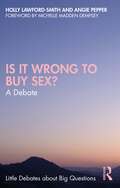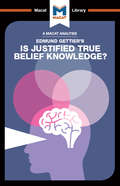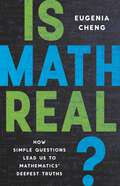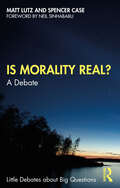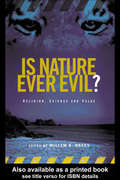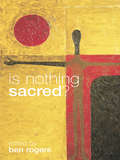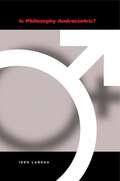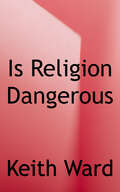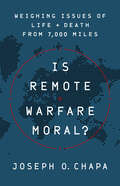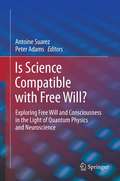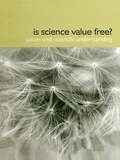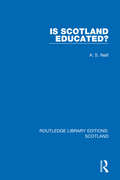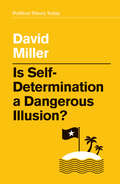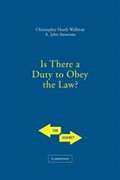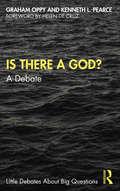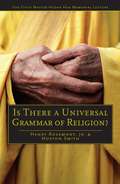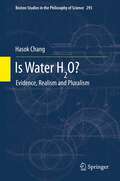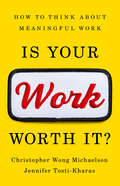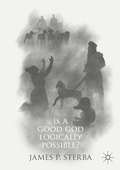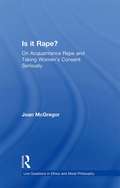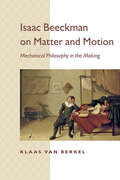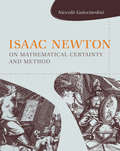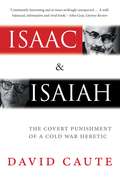- Table View
- List View
Is It Wrong to Buy Sex?: A Debate (Little Debates about Big Questions)
by Holly Lawford-Smith Angie PepperIs it wrong for a man to buy sex from a woman? In this book, Holly Lawford-Smith argues that it is wrong: commercial sex is quintessentially hierarchical sex, and it is wrong both to have, and to perpetuate a market in, hierarchical sex. Angie Pepper argues that it isn’t wrong: men are permitted to buy sex from those women who freely choose to sell it.Important but different interests are at stake in these two positions. According to the first, we should prioritize the interest of all women in securing a society that has achieved equality between the sexes, and we should make the changes needed to get there including prohibiting men from buying sex from women. In contrast, the second position prioritizes the protection of individuals' rights to engage in consensual commercial sex exchanges and demands that we strive for gender equality without compromising these rights. The two authors debate the ethical issues involved in the decision to buy sex, arguing passionately for very different conclusions, in a way that is lively, constructive, and sure to leave readers with a lot to think about.Key Features: Focuses on the pressing moral issue of whether we’re morally permitted to buy sex Advances two different normative ethical approaches to the issue and develops two competing arguments Demonstrates how philosophical debate on controversial topics can be productive and easy-to-follow Provides a glossary with definitions of key terms that are bolded in the main text Includes section summaries that give an overview of the main arguments and a comprehensive bibliography for further reading
Is Justified True Belief Knowledge?
by Jason SchukraftFor 2,000 years, the standard philosophical model of knowledge was that it could be defined as a justified true belief. According to this way of thinking, we can know, for example, that we are human because [1] we believe ourselves to be human; [2] that belief is justified (others treat us as humans, not as dogs); and [3] the belief is true. This definition, which dates to Plato, was challenged by Edmund Gettier in one of the most influential works of philosophy published in the last century – a three page paper that produced two clear examples of justified true beliefs that could not, in fact, be considered knowledge. Gettier's achievement rests on solid foundations provided by his mastery of the critical thinking skill of analysis. By understanding the way in which Plato – and every other epistemologist – had built their arguments, he was able to identify the relationships between the parts, and the assumptions that underpinned then. That precise understanding was what Gettier required to mount a convincing challenge to the theory – one that was bolstered by a reasoning skill that put his counter case pithily, and in a form his colleagues found all but unchallengeable.
Is Math Real?: How Simple Questions Lead Us to Mathematics' Deepest Truths
by Eugenia ChengOne of the world&’s most creative mathematicians offers a &“brilliant&” and &“mesmerizing&” (Popular Science) new way to look at math—focusing on questions, not answers Winner of the Los Angeles Times Book Prize and a New Scientist Best Book of the Year Where do we learn math: From rules in a textbook? From logic and deduction? Not really, according to mathematician Eugenia Cheng: we learn it from human curiosity—most importantly, from asking questions. This may come as a surprise to those who think that math is about finding the one right answer, or those who were told that the &“dumb&” question they asked just proved they were bad at math. But Cheng shows why people who ask questions like &“Why does 1 + 1 = 2?&” are at the very heart of the search for mathematical truth. Is Math Real? is a much-needed repudiation of the rigid ways we&’re taught to do math, and a celebration of the true, curious spirit of the discipline. Written with intelligence and passion, Is Math Real? brings us math as we&’ve never seen it before, revealing how profound insights can emerge from seemingly unlikely sources.
Is Morality Real?: A Debate (Little Debates about Big Questions)
by Matt Lutz Spencer CaseIn this book, Spencer Case and Matt Lutz debate whether objective moral facts exist. We often say that actions like murder and institutions like slavery are morally wrong. And sometimes people strenuously disagree about the moral status of actions, as with abortion. But what, if anything, makes statements about morality true? Should we be realists about morality, or anti-realists? After the authors jointly outline the major contemporary positions in the moral realism debate, each author argues for his own preferred views and responds to the other’s constructive arguments and criticisms. Case contends that there are moral truths that don't depend on human beliefs or attitudes. Lutz maintains that there are no moral truths, and even if there were, we wouldn't be in a position to know about them. Along the way, they explore topics like the nature of common sense, the meaning of moral language, and why the realism/anti-realism debate matters. The authors develop their own arguments and responses, but assume no prior knowledge of metaethics. The result is a highly accessible exchange, providing new students with an opinionated gateway to this important area of moral philosophy. But the authors’ originality gives food for thought to seasoned philosophers as well. Key Features Gives a comprehensive overview of all the main positions on moral realism, without assuming any prior knowledge on the subject Features both traditional and original arguments for each position Offers highly accessible language without sacrificing intellectual rigor Draws upon, and builds on, recent literature on the realism/anti-realism debate Uses only a limited number of technical terms and defines all of them in the glossary
Is Nature Ever Evil?: Religion, Science and Value
by Willem B. DreesCan nature be evil, or ugly, or wrong? Can we apply moral value to nature?From a compellingly original premise, under the auspices of major thinkers including Mary Midgley, Philip Hefner, Arnold Benz and Keith Ward, Is Nature Ever Evil? examines the value-structure of our cosmos and of the science that seeks to describe it. Science, says editor Willem B. Drees, claims to leave moral questions to aesthetic and religious theory. But the supposed neutrality of the scientific view masks a host of moral assumptions. How does an ethically transparent science arrive at concepts of a 'hostile' universe or a 'selfish' gene? How do botanists, zoologists, cosmologists and geologists respond to the beauty of the universe they study, reliant as it is upon catastrophe, savagery, power and extinction? Then there are various ways in which science seeks to alter and improve nature. What do prosthetics and gene technology, cyborgs and dairy cows say about our appreciation of nature itself? Surely science, in common with philosophy, magic and religion, can aid our understanding of evil in nature - whether as natural catasrophe, disease, predatory cruelty or mere cosmic indifference?Focusing on the ethical evaluation of nature itself, Is Nature Ever Evil? re-ignites crucial questions of hope, responsibility, and possibility in nature.
Is Nothing Sacred?
by Ben RogersWe call many things sacred, from cows, churches and paintings to flags and burial grounds. Is it still meaningful to talk of things being sacred, or is the idea merely a relic of a bygone religious age? Does everything - and every life - have its price? Is Nothing Sacred? is a stimulating and wide-ranging debate about some of the major moral dilemmas facing us today, such as the value of human life, art, the environment, and personal freedom. Packed with clearly presented controversial issues, we are asked to decide whether we should revere life when someone chooses to die, preserve the giant California redwoods, cherish Vermeer's originals for their own sake, or curtail personal freedom for the greater good. Ronald Dworkin argues that the concept of the scared is essential to any human ethics, and Simon Blackburn explains why he thinks 'a humanist should not feel guilty at the emotions of awe and reverence that can be inspired by great religious works of art. Throughout, the idea of the sacred in a secular age is hotly debated amongst the authors and put to the test: should it be abandoned altogether, or does it still have something to teach us?Is Nothing Sacred? brings together outstanding philosophers and thinkers, including Suzanne Uniacke, Michael Clark, Alan Holland, Simon Blackburn, Richard Dawkins, Richard Norman, Alan Howarth, Nigel Warburton, Matthew Kieran and John Harris.
Is Philosophy Androcentric?
by Iddo LandauIn Is Philosophy Androcentric?, Iddo Landau contends that none of the arguments for viewing philosophy as pervasively androcentric ultimately stand up to rational scrutiny, while the ones that show it to be nonpervasively androcentric do not undermine it in the way that many critics have supposed. “Philosophy emerges, in almost all of its parts,” he concludes, “as human rather than male, and most parts and aspects of it need not be rejected or rewritten."
Is Religion Dangerous?
by Keith WardMany commentators today claim that religion is dangerous and harmful. In addressing this question, Keith Ward begins by defining what religion actually is and how most human harm has been caused. He then looks at why people say that religion is dangerous, focusing particularly on religious wars and conflicts and on specific attacks on religion, such as the claims that God is wrathful, that religion is intolerant, that religious morality is primitive and cruel. <p><p>Keith Ward argues that religion produces great good - for example, in terms of hospitals, the abolition of slavery, great art and music, moral heroism, and philosophy and science. Religion, he concludes, is the best rational basis for morality.
Is Remote Warfare Moral?: Weighing Issues of Life and Death from 7,000 Miles
by Joseph O ChapaAmerica is at an important turning point. Remote warfare is not just a mainstay of post–9/11 wars, it is a harbinger of what lies ahead—a future of high-tech, artificial intelligence–enabled, and autonomous weapons systems that raise a host of new ethical questions. Most fundamentally, is remote warfare moral? And if so, why? Joseph O. Chapa, with unique credentials as Air Force officer, Predator pilot, and doctorate in moral philosophy, serves as our guide to understanding this future, able to engage in both the language of military operations and the language of moral philosophy. Through gripping accounts of remote pilots making life-and-death decisions and analysis of high-profile cases such as the killing of Iranian high government official General Qasem Soleimani, Chapa examines remote warfare within the context of the just war tradition, virtue, moral psychology, and moral responsibility. He develops the principles we should use to evaluate its morality, especially as pilots apply human judgment in morally complex combat situations. Moving on to the bigger picture, he examines how the morality of human decisions in remote war is situated within the broader moral context of US foreign policy and the future of warfare.
Is Science Compatible with Free Will?
by Antoine Suarez Peter AdamsAnyone who claims the right 'to choose how to live their life' excludes any purely deterministic description of their brain in terms of genes, chemicals or environmental influences. For example, when an author of a text expresses his thoughts, he assumes that, in typing the text, he governs the firing of the neurons in his brain and the movement of his fingers through the exercise of his own free will: what he writes is not completely pre-determined at the beginning of the universe. Yet in the field of neuroscience today, determinism dominates. There is a conflict between the daily life conviction that a human being has free will, and deterministic neuroscience. When faced with this conflict two alternative positions are possible: Either human freedom is an illusion, or deterministic neuroscience is not the last word on the brain and will eventually be superseded by a neuroscience that admits processes not completely determined by the past. This book investigates whether it is possible to have a science in which there is room for human freedom. The book generally concludes that the world and the brain are governed to some extent by non-material agencies, and limited consciousness does not abolish free will and responsibility. The authors present perspectives coming from different disciplines (Neuroscience, Quantumphysics and Philosophy) and range from those focusing on the scientific background, to those highlighting rather more a philosophical analysis. However, all chapters share a common characteristic: they take current scientific observations and data as a basis from which to draw philosophical implications. It is these features that make this volume unique, an exceptional interdisciplinary approach combining scientific strength and philosophical profundity. We are convinced that it will strongly stimulate the debate and contribute to new insights in the mind-brain relationship.
Is Science Multicultural? Postcolonialisms, Feminisms, and Epistemologies
by Sandra HardingThis book explores what the last three decades of European/American, feminist, and postcolonial science and technology studies can learn from each other. Sandra introduces and discusses an array of postcolonial science studies.
Is Science Value Free?: Values and Scientific Understanding (Philosophical Issues in Science)
by Hugh LaceyExploring the role of values in scientific inquiry, Hugh Lacey examines the nature and meaning of values, and looks at challenges to the view, posed by postmodernists, feminists, radical ecologists, Third-World advocates and religious fundamentalists, that science is value free. He also focuses on discussions of 'development', especially in Third World countries. This paperback edition includes a new preface.
Is Scotland Educated? (Routledge Library Editions: Scotland #21)
by A. S. NeillOriginally published in 1936, and with more than a slightly tongue-in-cheek tone at times, the author of this book declares that Scotland is not educated but merely learned. This book does not deal with education in its narrowest sense: it ranges from the Kirk to Haggis, Tartans and Burns, Whisky and repressed sex in its discussion, proclaiming Calvinism as the root of most of Scotland’s evils. Honest and at times provocative, this volume does give direct access to the emotional roots of Neill’s feelings about Scottish education.
Is Self-Determination a Dangerous Illusion? (Political Theory Today)
by David MillerClaims to self-determination are rife in world politics today. They range from Scottish and Catalonian campaigns for independence to calls for the devolution of power to regions and cities. But is self-determination meaningful or desirable in the twenty-first century, or merely a dangerous illusion? In this book, David Miller mounts a powerful defence of political self-determination. He explains why it is valuable and argues that geographic proximity alone is not enough for groups to have the capacity for self-determination: group members must also identify with each other. He explores the different political forms that self-determination can take, and he suggests some realistic constraints on how it can be achieved, concluding that people exercising their collective agency is still both feasible and important. Anyone concerned by the theoretical issues raised by the various secessionist and nationalist movements around the world should read this book.
Is There a Duty to Obey the Law? (For and Against Series)
by Christopher Heath Wellman A. John SimmonsThe central question in political philosophy is whether political states have the right to coerce their constituents and whether citizens have a moral duty to obey the commands of their state. In this book, Christopher Heath Wellman and A. John Simmons defend opposing answers to this question. Wellman bases his argument on samaritan obligations to perform easy rescues, arguing that each of us has a moral duty to obey the law as his or her fair share of the communal samaritan chore of rescuing our compatriots from the perils of the state of nature. Simmons counters that this, and all other attempts to explain our duty to obey the law, fail. He defends a position of philosophical anarchism, the view that no existing state is legitimate and that there is no strong moral presumption in favor of obedience to, or compliance with, any existing state.
Is There a God?: A Debate (Little Debates about Big Questions)
by Graham Oppy Kenneth L. PearceBertrand Russell famously quipped that he didn’t believe in God for the same reason that he didn’t believe in a teapot in orbit between the earth and Mars: it is a bizarre assertion for which no evidence can be provided. Is belief in God really like belief in Russell’s teapot? Kenneth L. Pearce argues that God is no teapot. God is a real answer to the deepest question of all: why is there something rather than nothing? Graham Oppy argues that we should believe that there are none but natural causal entities with none but natural causal properties—and hence should believe that there are no gods. Beginning from this basic disagreement, the authors proceed to discuss and debate a wide range of philosophical questions, including questions about explanation, necessity, rationality, religious experience, mathematical objects, the foundations of ethics, and the methodology of philosophy. Each author first presents his own side, and then they interact through two rounds of objections and replies. Pedagogical features include standard form arguments, section summaries, bolded key terms and principles, a glossary, and annotated reading lists. In the volume foreword, Helen De Cruz calls the debate "both edifying and a joy," and sums up what’s at stake: "Here you have two carefully formulated positive proposals for worldviews that explain all that is: classical theism, or naturalistic atheism. You can follow along with the authors and deliberate: which one do you find more plausible?" Though written with beginning students in mind, this debate will be of interest to philosophers at all levels and to anyone who values careful, rational thought about the nature of reality and our place in it.
Is There a Universal Grammar of Religion?
by Huston Smith Henry Rosemont Jr.In this provocative volume two important scholars of religion, Huston Smith and Henry Rosemont, Jr., put forth their viewpoints and share a probing conversation. Though the two diverge considerably in their accounts of religious faith and practice, they also agree on fundamental points. Huston Smith, author of the important work The World's Religions, has long argued for the fundamental equality of the world's religions. Describing a "universal grammar of religion," he argues that fourteen points of similarity exist among all of the major religious traditions and that these similarities indicate an innate psychological affinity for religion within the human spirit. As Noam Chomsky has argued that humans are hardwired to use language, Smith similarly argues that humans are hardwired for religious experience. In response, Rosemont explicates his humanistic vision of the world, in which the "homoversal" tendency to contemplate the infinite is part of our co-humanity that endures across time, space, language, and culture. Rosemont also elaborates upon Noam Chomsky's theory of universal grammar and its relevance to Smith's ideas about the similarities among religions. This insightful exploration of the most essential basis of religion provides a new direction for comparative-religion scholars everywhere.
Is Water H2O?
by Hasok ChangThis book exhibits deep philosophical quandaries and intricacies of the historical development of science lying behind a simple and fundamental item of common sense in modern science, namely the composition of water as H2O. Three main phases of development are critically re-examined, covering the historical period from the 1760s to the 1860s: the Chemical Revolution (through which water first became recognized as a compound, not an element), early electrochemistry (by which water's compound nature was confirmed), and early atomic chemistry (in which water started out as HO and became H2O). In each case, the author concludes that the empirical evidence available at the time was not decisive in settling the central debates, and therefore the consensus that was reached was unjustified, or at least premature. This leads to a significant re-examination of the realism question in the philosophy of science, and a unique new advocacy for pluralism in science. Each chapter contains three layers, allowing readers to follow various parts of the book at their chosen level of depth and detail. The second major study in "complementary science", this book offers a rare combination of philosophy, history and science in a bid to improve scientific knowledge through history and philosophy of science.
Is Your Work Worth It?: How to Think About Meaningful Work
by Jennifer Tosti-Kharas Christopher Wong MichaelsonWhat is work that&’s worth doing in a life worth living? A revealing exploration of the questions we ask and the stories we tell about our work. According to recent studies, barely a third of American workers feel &“engaged&” at work, and for many people around the world, happiness is lowest when earning power is highest. After a global pandemic that changed why, how, and what people do for a living, many workers find themselves wondering what makes their daily routine worthwhile. In Is Your Work Worth It?, two professors – a philosopher and organizational psychologist – investigate the purpose of work and its value in our lives. The book explores vital questions, such as: Should you work for love or money? When and how much should you work? What would make life worth living in a world without work? What kind of mark will your work leave on the world? This essential book combines inspiring and harrowing stories of real people with recent scholarship, ancient wisdom, arts, and literature to help us clarify what worthy work looks like, what tradeoffs are acceptable to pursue it, and what our work can contribute to society.
Is a Good God Logically Possible?
by James P. SterbaUsing yet untapped resources from moral and political philosophy, this book seeks to answer the question of whether an all good God who is presumed to be all powerful is logically compatible with the degree and amount of moral and natural evil that exists in our world. It is widely held by theists and atheists alike that it may be logically impossible for an all good, all powerful God to create a world with moral agents like ourselves that does not also have at least some moral evil in it. James P. Sterba focuses on the further question of whether God is logically compatible with the degree and amount of moral and natural evil that exists in our world. The negative answer he provides marks a new stage in the age-old debate about God's existence.
Is it Rape?: On Acquaintance Rape and Taking Women's Consent Seriously (Live Questions in Ethics and Moral Philosophy)
by Joan McGregorThe issue of acquaintance rape has been gaining increased prominence in recent years. In this book Joan McGregor analyses the ethical and legal problems that arise in connection with acquaintance rape cases. She discusses with great clarity and precision the complexities involved in notions such as consent, force, autonomy, power, intention and the impairment of responsibility through drugs, alcohol and mental illness. Arguing that criminal rape laws are too narrow, capturing only cases where there is clearly recognized physical violence and resistance from the victim, she sets out a new proposal for how the criminal law should deal with cases of nonconsensual sex which captures the ideals of a liberal political society and in particular the idea of equality. This book explains fully what it means when a woman says no and means no.
Isaac Beeckman on Matter and Motion: Mechanical Philosophy in the Making
by Klaas van BerkelExplore the work of a founding father of the mechanical philosophy of nature, Isaac Beeckman (1588–1637).The contribution of the Dutch craftsman and scholar Isaac Beeckman to early modern scientific thought has never been properly acknowledged. Surprisingly free from the constraints of traditional natural philosophy, he developed a view of the world in which everything, from the motion of the heavens to musical harmonies, is explained by reducing it to matter in motion. His ideas deeply influenced Descartes and Gassendi. Klaas van Berkel has succeeded in unearthing and explicating Beeckman's scientific notebooks, allowing us to follow how he developed his new philosophy, almost day by day.Beeckman was almost forgotten until the discovery of his notebooks in the early twentieth century. Isaac Beeckman on Matter and Motion is the first full-length study of the ideas and motives of this remarkable figure. Van Berkel's important study first relates Beeckman's life, placing him in the religious, intellectual, educational, and social context of the Dutch Republic in its golden age. Van Berkel then analyzes the notebooks themselves and the nature and development of Beeckman's "mechanical philosophy." He demonstrates how Beeckman's artisanal background and religious convictions shaped his natural philosophy, even as the decisive influence stems from the educational philosophy of the sixteenth-century French philosopher Peter Ramus. Historians of science and the philosophy of science will find the substance of Beeckman's thought and the unraveling of its growth and development highly interesting. Van Berkel's account provides a new and comprehensive interpretation of the origins of the mechanical philosophy of nature, the philosophy that culminated in the work of Isaac Newton.
Isaac Newton
by Andrew Janiak Isaac NewtonSir Isaac Newton (1642-1727) left a voluminous legacy of writings. Despite his influence on the early modern period, his correspondence, manuscripts, and publications in natural philosophy remain scattered throughout many disparate editions. In this volume, Newton's principal philosophical writings are for the first time collected in a single place. They include excerpts from the Principia and the Opticks, his famous correspondence with Boyle and with Bentley, and his equally significant correspondence with Leibniz, which is often ignored in favor of Leibniz's later debate with Samuel Clarke. Newton's exchanges with Leibniz place their different understandings of natural philosophy in sharp relief. The volume also includes 'De Gravitatione', offered here in a corrected translation, which is crucial for understanding Newton's relation to his great predecessor Descartes. In a historical and philosophical introduction, Andrew Janiak examines Newton's philosophical positions and his relations to canonical figures in early modern philosophy.
Isaac Newton on Mathematical Certainty and Method (Transformations: Studies in the History of Science and Technology)
by Niccolo GuicciardiniAn analysis of Newton's mathematical work, from early discoveries to mature reflections, and a discussion of Newton's views on the role and nature of mathematics.Historians of mathematics have devoted considerable attention to Isaac Newton's work on algebra, series, fluxions, quadratures, and geometry. In Isaac Newton on Mathematical Certainty and Method, Niccolò Guicciardini examines a critical aspect of Newton's work that has not been tightly connected to Newton's actual practice: his philosophy of mathematics. Newton aimed to inject certainty into natural philosophy by deploying mathematical reasoning (titling his main work The Mathematical Principles of Natural Philosophy most probably to highlight a stark contrast to Descartes's Principles of Philosophy). To that end he paid concerted attention to method, particularly in relation to the issue of certainty, participating in contemporary debates on the subject and elaborating his own answers. Guicciardini shows how Newton carefully positioned himself against two giants in the “common” and “new” analysis, Descartes and Leibniz. Although his work was in many ways disconnected from the traditions of Greek geometry, Newton portrayed himself as antiquity's legitimate heir, thereby distancing himself from the moderns. Guicciardini reconstructs Newton's own method by extracting it from his concrete practice and not solely by examining his broader statements about such matters. He examines the full range of Newton's works, from his early treatises on series and fluxions to the late writings, which were produced in direct opposition to Leibniz. The complex interactions between Newton's understanding of method and his mathematical work then reveal themselves through Guicciardini's careful analysis of selected examples. Isaac Newton on Mathematical Certainty and Method uncovers what mathematics was for Newton, and what being a mathematician meant to him.
Isaac and Isaiah
by David CauteRancorous and highly public disagreements between Isaiah Berlin and Isaac Deutscher escalated to the point of cruel betrayal in the mid-1960s, yet surprisingly the details of the episode have escaped historians' scrutiny. In this gripping account of the ideological clash between two of the most influential scholars of Cold War politics, David Caute uncovers a hidden story of passionate beliefs, unresolved antagonism, and the high cost of reprisal to both victim and perpetrator.Though Deutscher (1907-1967) and Berlin (1909-1997) had much in common--each arrived in England in flight from totalitarian violence, quickly mastered English, and found entry into the Anglo-American intellectual world of the 1950s--Berlin became one of the presiding voices of Anglo-American liberalism, while Deutscher remained faithful to his Leninist heritage, resolutely defending Soviet conduct despite his rejection of Stalin's tyranny. Caute combines vivid biographical detail with an acute analysis of the issues that divided these two icons of Cold War politics, and brings to light for the first time the full severity of Berlin's action against Deutscher.
